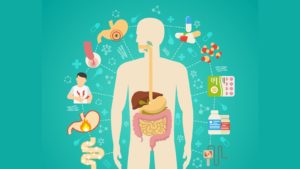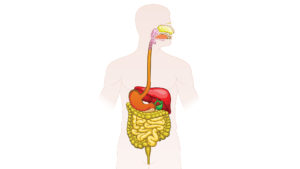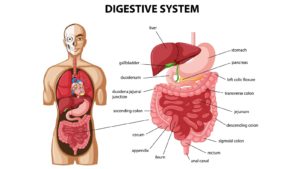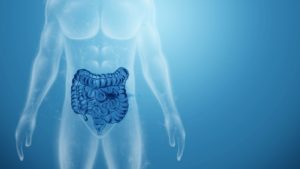The digestive system of humans and healthy digestion is the foundation of health given the important role it plays in maintaining our general health. This amazing system works nonstop to break down the food we eat and absorb vital minerals to keep us healthy.
The digestion system is a main part of the realm of the Human Body because food entered there and gets converted into the energy that works the entire body.
Every cell in our body receives energy from the digestive system, which also effectively removes waste.
This track is the first place to have your food and spreads it to the whole body.
In simple words, neglecting the requirements of the digestive system of humans has in-depth effects that have an impact on numerous elements of our lives.
Healthy digestion or good digestive health is as important as breathing.
The decisions we make about our nutrition and way of living have a big impact on how healthy our digestive system is. Fortunately, even minor improvements can have a big impact on these areas.
The Digestive System Definition

The breakdown, absorption, and processing of food in the human body is carried out by the digestive system, commonly referred to as the gastrointestinal system or digestive tract. The digestion system is necessary for taking out nutrients, water, and electrolytes from swallowed food and getting rid of waste.
The mouth, esophagus, stomach, small intestine, large intestine (colon), rectum, and anus are the primary organs of the digestive system of humans.
Each organ has a distinct role in the digesting process as a whole. In the mouth, food is routinely broken down by chewing and combined with saliva, which includes enzymes that start the chemical breakdown of carbohydrates, to begin the digestive process.
Swallowing is the process by which food moves from the mouth through the esophagus, a muscular tube, and into the stomach.
Further in The digestive system of humans, the food is further broken down and combined with gastric juices in the stomach, including enzymes and hydrochloric acid, which help in the breakdown of proteins and microbial flora. The partially digested meal then enters the small intestine as a chime in the digestion system.
The small intestine is where nutrients are absorbed most effectively. The duodenum, jejunum, and ileum make up its three sections. Proteins, carbs, and lipids are broken down into smaller molecules by the pancreas and small intestine enzymes so that they can pass past the intestinal wall and into the bloodstream.
The small intestine’s undigested waste is moved to the big intestine, often known as the colon. Its primary roles include absorbing water, electrolytes, and several vitamins made by gut bacteria as well as forming and removing solid waste from the body in the digestion system.
The anus is the opening through which the feces are released during excretion, and the rectum acts as a temporary storage location for them.
To cut a long part short, the digestive system of humans works to consume food and expel waste from our bodies, and the health of our digestive system is significantly influenced by what we eat and how we live, and even small things matter.
Some wonders of the digestive system of humans

The Digestive System has some amazing Wonders.
- Every day, the average human digestive system breaks down about 30 feet (9 meters) of food.
- The small intestine, which plays a key role in digestion, is around 22 feet (7 meters) long.
- Our stomach is home to over 100 trillion microorganisms, collectively known as the gut microbiome.
The digestive system diagram

Tips for Good Health of the Digestive System of Humans

Make food beneficial, not just enjoyable to the eyes and tongue for the digestion system.
The significant relationship between what we eat and how it affects our health is direct and truthful. The need of selecting healthful, nourishing foods as a way to enhance general well-being and prevent disease is always genuine. Therefore:
- Include a range of healthy fruits and vegetables in your diet to obtain the necessary nutrients, fiber, and antioxidants.
- Choose whole grains and nuts to gain the benefits of dietary fiber and nutritious ingredients. Whole grains include things like brown rice, oatmeal, and goods made from whole wheat.
- Reduce your intake of added sugars as too much sugar upset your body’s balance of healthy bacteria and leads to inflammation.
- Healthier cooking is the key to the digestive system of humans. Cook your meals using healthier alternatives to frying and high-temperature grilling, such as steaming, stewing, poaching, boiling, or microwaving.
- Consume probiotic-rich foods to support a healthy gut and the digestion system, such as yogurt, kimchee, raw apple cider vinegar, garlic, and onion.
- Keep yourself hydrated by drinking enough water to maintain good bowel function and prevent constipation.
- Exercise on a daily basis to improve digestion as it lowers your risk of experiencing digestive problems including bloating and constipation, and increases your general wellbeing
- Maintaining a healthy weight minimizes the chance of developing a variety of the digestive system diseases.
- Giving up smoking is essential for digestive health as it raises the risk of ulcerative colitis, gastrointestinal malignancies, acid reflux, and stomach ulcers.
- 7-9 hours of high-quality sleep each night is going to do wonders.
Signs of Poor Digestive Health/ The digestion system illness

Listen to your body because this is the important thing, feel what it wants to say, and then don’t ignore it.
The digestive system of humans can lead to the digestive system diseases if you ignore what it is saying. So here is what could possibly happen.
- Constipation is a problem marked by infrequent stools less than three times per week or straining during bowel motions. Numerous factors can contribute to chronic constipation, which should be treated to maintain good gut health.
- Excessive gas with tummy pain, diarrhea, constipation, or unexplained weight loss also points to a digestive problem. It is wise to assess the original causes and, if required, seek medical assistance.
- Bloating is an uncomfortable feeling of fullness or as your stomach appears rounder than usual. It is recommended to talk to a healthcare person about your bloating if it continues or if it is accompanied by other digestive problems.
- Unintentional weight loss can be an indication of a more serious issue if it occurs without a significant change in diet or lifestyle. If weight reduction coexists with gastrointestinal or intestinal problems, seek quick medical attention for the digestion system.
- The digestive system diseases, including infections, motion sickness, or digestive conditions can be the cause of stubborn nausea and frequent vomiting. Dehydration signs and prolonged vomiting should be assessed by a doctor.
- If you experience heartburn that is unable to find relief from medication, you may have gastroesophageal reflux disease (GERD). In such circumstances, speaking with a healthcare professional is advised.
- Abdominal pain or discomfort might be related to indigestion, gas symptoms, or muscle strain.
However, a medical expert should be consulted if the pain is severe or chronic and is accompanied by other symptoms including fever, abdominal swelling, blood in the stool, continued nausea or vomiting, yellow skin, or soreness to the touch.
Conclusion
The digestive system of humans or the digestion system is one of the important body functions that must never be ignored.
The importance of promoting the digestive system’s health and functionality can increase the effectiveness of our digestive systems.
Let your body have the food, not the garbage or the digestive system diseases.
If you have everything, but not good health, everything will appear pointless and hard. Your life would be horrible, so why not feel the blessing now and care about your overall health.
So, did you understand the importance and value of the digestive system of humans?













